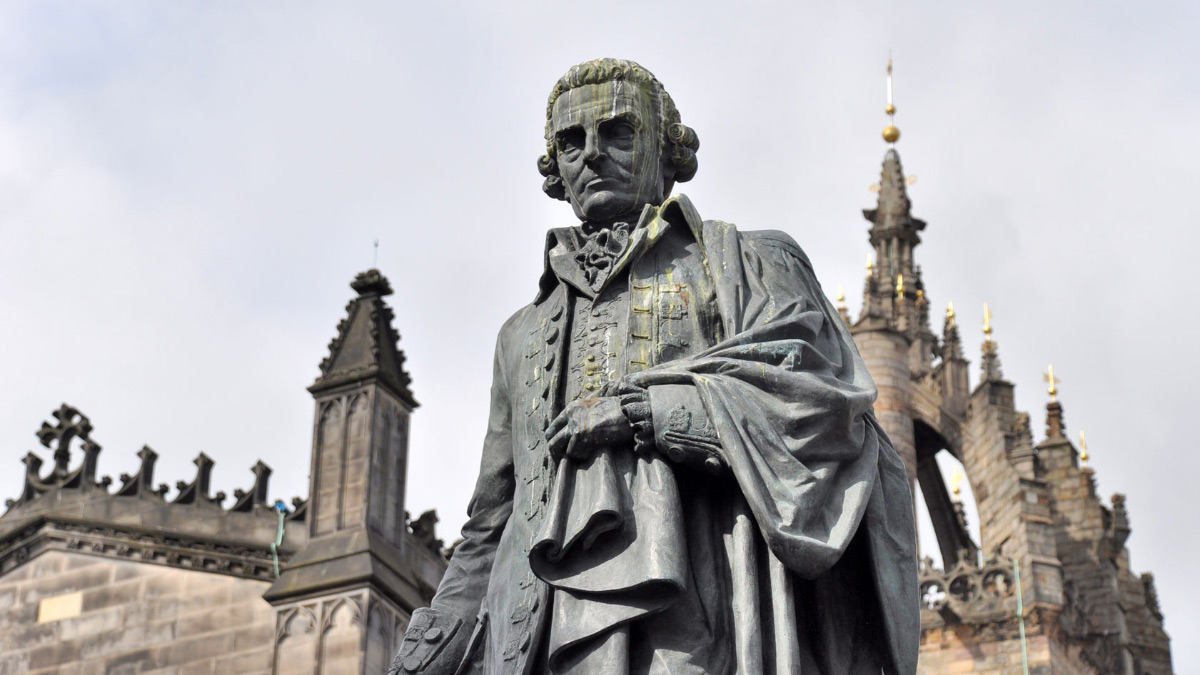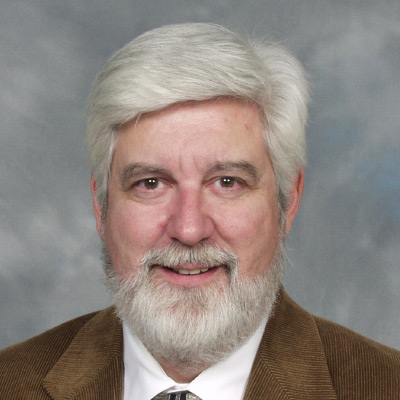Adam Smith was born in Kirkcaldy, Scotland, near Edinburgh, in 1723.[1] His father died before Smith was born, but his will provided money for tutors and guardians, so Smith became well educated. At age 14 he enrolled at Glasgow University. After three years, he traveled to England to attend Balliol College, Oxford, for the next six years, returning to Kirkcaldy in 1746.
Smith earned money lecturing and soon gained a reputation that enabled him to live quite comfortably. He was invited in 1751 to join the faculty of Glasgow University as professor of logic. The following year, he moved to the chair in moral philosophy, lecturing until 1763 on natural theology, ethics, jurisprudence and, finally, political economy. Smith’s notes on theology are lost to history, but his notes on jurisprudence were published as Lectures on Jurisprudence in 1896, more than a century after his death. In 1759 his lectures on ethics became The Theory of Moral Sentiments, a work that greatly enhanced his reputation. Of course, his lectures on political economy are available to us in the form of his masterpiece, An Inquiry into the Nature and Causes of the Wealth of Nations, first published in 1776.
Smith was able to leave his teaching position after the success of his 1759 book and his well-paid appointment as tutor to the Duke of Buccleuch. Traveling with his pupil in France and surrounding areas, Smith met a number of important thinkers and writers and came to enjoy his tutorial work, always making observational notes during his travels. The notes would later be used to provide empirical support for his theoretical arguments in Wealth of Nations. While visiting Paris, Smith met Francois Quesnay and A. R. J. Turgot, the leading theorists of the Physiocrat school of political economy, which was then at the height of its influence.
Returning to London in 1766, Smith worked on revisions to his Theory of Moral Sentiments until the next year. He then returned to Kirkcaldy, where he began work on Wealth of Nations, completed nine years later. It was an immediate success and went through five editions by 1789. Two years after Wealth of Nations was published, Smith actively sought and won an appointment as commissioner of customs for Scotland. Strangely, Smith spent the last 12 years of his life (1778–90) attempting to enforce the very type of protectionist regulations against which he had argued so impressively in Wealth of Nations. [2]
Since the publication of Wealth of Nations, Smith’s theories and ultimate purpose have been the subject of controversy. Not everyone thinks of him as a great economic philosopher.[3] But no one can deny the impressive influence Smith had on the policies of his time and even, in the case of Marxism, on the theoretical positions of his most vocal opponents. As Wesley Mitchell put it, Smith sought to convince people that “the wealth of a nation would be promoted with vastly greater effectiveness by the ‘obvious and simple system of natural liberty’ than by national planning of the mercantilist sort.”[4] And like John Maynard Keynes, Smith offered more in his Wealth of Nations than economic theory; he proffered policy solutions to what he saw as continuing economic problems. He claimed, as did Keynes, that his solutions would improve macroeconomic performance and national prosperity.
But whatever his motivations, Smith’s life demonstrates the incredible power of one individual’s efforts to profoundly change things. An obscure professor writing works that few could—or did—read, he nonetheless successfully impressed his economic model upon a future world that he would not live to see.[5] For in his own time, mercantilism dominated public policy discussions, and the state and its planners directed all economic activities. Smith’s theoretical emphasis on individual people as rational utility maximizers whose aggregate efforts brought forth greater overall economic prosperity was an extremely radical proposition in its day and even in the places where Smith propounded his analysis.
Even more radical was Smith’s belief that a society composed of individuals acting in pursuit of their own interests would result in a stable, free and more prosperous society than one regimented and planned by the state. Smith took Isaac Newton’s vision of a universe running by itself according to natural laws and applied it to society as a whole and to economic activity in particular. In the recorded history of humanity, no contention has generated more controversy than this simple idea based on faith in the wonders people can achieve when allowed to trade and live in freedom. In fact, the majority of what we today call politics is some proposed, practical application of state power that is tempered by this ongoing debate between Smith’s generally laissez-faire approach and the approach of planning proponents who claim they can create superior outcomes through coercion.
For Smith, economic growth is good and is achieved by the everwidening application of the division of labor, which is organized within markets and driven by rational self-interest. Those nations that allow market forces to generate such growth will become wealthier, in Smith’s view, than those that follow the mercantile model of managed trade.[6] In his writings on policy issues in Wealth of Nations, Smith lays out the proper role for state activity. He maintains that there are three areas for legitimate governmental activity in society: defense against external and internal security threats, the formation of laws that prevent individuals from oppressing one another and the provision of public goods that the market would not supply.
There is, of course, room for disagreement about the scope of state activities within that third governmental task. To Smith, it meant certain highrisk, large efforts such as canal building. In our day, almost every good and service has found advocates who wish it to be made public and, hence, into a long-term taxpayer liability. Although Smith would disagree with the vast expansion of public undertakings, it is unlikely that he would be surprised at the drift of policy since his death.
Regardless of our own predilections to agree or disagree with Smith, his influence on all of us today is probably greater than it was on his contemporaries or those who lived immediately after Wealth of Nations was published. He is regarded as not merely the father of modern political economy or just a starting point for a history of thought class but a system builder who sought to integrate ethics, morality, political economy and jurisprudence into a coherent whole. We will endlessly debate the extent to which he succeeded in this task—that, in itself, is testimony to his continuing influence and importance. We have, to a large extent, abandoned his system of natural liberty by expanding state interventions into our daily affairs, but his metaphor of the invisible hand remains not just immortal but never improved upon as a description of the market’s ongoing process.
In George Stigler’s judgment, Smith’s greatest achievement was to “put into the center of economics the systematic analysis of the behavior of individuals pursuing their self-interest under conditions of competition. This theory was the crown jewel of [Wealth of Nations], and it became, and remains to this day, the foundation of the theory of the allocation of resources. The proposition that resources seek their most profitable uses, so that in equilibrium the rates of return to a resource in various uses will be equal, is still the most important substantive proposition in all economics.”[7]
Smith was a true scholar, a masterful observer and chronicler of real events, a persuasive and insightful author and, not least important, a beloved, dedicated and extremely effective pedagogue. To paraphrase Sir Thomas More: Not a bad life, that. Smith died in July 1790 after more than a decade of opulent, agreeable living supported by his tutor’s pension, his royalties and his salary from the government of Scotland. He died with these words to his companions: “I love your company, gentlemen, but I believe I must leave you to go to another world.”[8] Just before he died, he implored close acquaintances to burn all his unpublished works, which came to 16 volumes. Unfortunately, his friends did as he requested, leaving us but a fraction of his output. But what a fraction! Smith is buried in Edinburgh, Scotland, in a large if not especially well-visited or well-maintained grave.
Notes
[1] Ross, Ian Simpson (1995), The Life of Adam Smith (Oxford: Clarendon Press). The exact date of Smith’s birth is not known, but he was baptized on June 5, 1723.
[2] Skousen, Mark (2001), The Making of Modern Economics: The Lives and Ideas of the Great Thinkers (Armonk, N.Y.: M. E. Sharpe). Upon securing the customs appointment, Smith burned his clothes because they were not in compliance with England’s complex trade restrictions and suggested to friends that they do likewise.
[3] For an example of outright hostility, see Rothbard, Murray (1995), Classical Economics: An Austrian Perspective on the History of Economic Thought, vols. 1 and 2 (Hants, UK: Edward Elgar).
[4]Mitchell, Wesley C. (1967, 48), Types of Economic Theory, vols. 1 and 2 (New York: Augustus Kelley).
[5] Blaug, Mark (1997, 33–34), Economic Theory in Retrospect, 5th ed. (Cambridge: Cambridge University Press). Blaug reprints an amusing paragraph by Glenn Morrow to the effect that no one has ever read Wealth of Nations cover to cover. As for changing the world, in Smith’s case, Keynes’ famous description of “academic scribblers” was never more on target. See Keynes, John Maynard (1964, 383), The General Theory of Employment, Interest and Money (New York: Harcourt, Brace and World), orig. pub. 1936.
[6] Robbins, Lionel (1998, 128–29), A History of Economic Thought: The LSE Lectures, ed. Steven Medema and Warren Samuels (Princeton, N.J.: Princeton University Press).
[7] Stigler, George (1982, 147–48), The Economist as Preacher and Other Essays (Chicago: University of Chicago Press).
[8] Skousen, Mark (2001, 31), The Making of Modern Economics: The Lives and Ideas of the Great Thinkers (Armonk, N.Y.: M. E. Sharpe).








